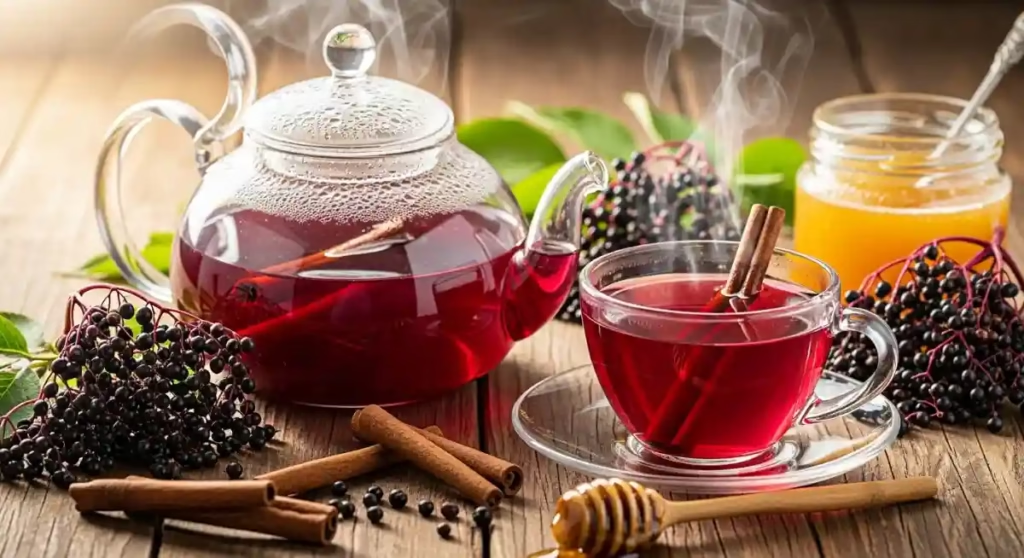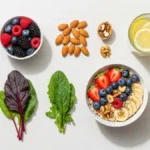Introduction
In the world of natural remedies and herbal teas, elderberry tea has earned a special place for its immune-boosting and healing properties. Made from the dried flowers or berries of the elder tree (Sambucus nigra), this traditional brew has been used in natural medicine for centuries. Today, it remains popular, especially during flu season, because of its antioxidant and antiviral potential.
In this detailed guide, we’ll explore everything you need to know about this berry-based infusion — its health benefits, nutritional profile, potential side effects, how to prepare it at home, and why it has become a go-to natural remedy for many.
What Is Elderberry Tea?
Tea made from elderberries is a caffeine-free herbal drink prepared from the berries or flowers of the elder plant. These small, dark purple fruits grow on the elder tree, native to Europe but now cultivated worldwide. The brew has a naturally tangy, slightly earthy flavor and is often sweetened with honey or blended with other herbs for a soothing drink.
Traditionally, this herbal elderberry drink has been used for:
- Relieving cold and flu symptoms
- Supporting the immune system
- Reducing inflammation
- Promoting skin health
Modern science is now beginning to validate many of these traditional uses.
Nutritional Profile of Elderberry Infusion
Berries from the elder tree are rich in vitamins, minerals, and antioxidants that contribute to the benefits of this herbal drink. A typical cup may contain:
- Vitamin C – Essential for immune function and skin health
- Dietary Fiber – Supports digestion and gut health
- Flavonoids & Anthocyanins – Powerful antioxidants that fight oxidative stress
- Vitamin A – Important for vision and immune defense
- Iron & Potassium – Key minerals for overall wellness
This nutrient-dense profile makes the berry infusion a natural supplement for maintaining good health.
Health Benefits of Elderberry Tea
1. Boosts the Immune System
One of the most well-known benefits of this herbal drink is its ability to strengthen the immune system. Elderberries are loaded with antioxidants, especially flavonoids, which help the body fight infections and reduce the severity of cold and flu symptoms.
Studies suggest that elderberry extract may shorten the duration of flu and cold symptoms by up to four days.
2. Rich in Antioxidants
Elderberries contain anthocyanins, the compounds that give them their deep purple color. These antioxidants neutralize free radicals, helping to reduce cellular damage and lower the risk of chronic diseases. Regular consumption of an elderberry infusion may promote better skin, heart health, and overall longevity.
3. May Help with Cold and Flu Relief
Traditionally, this fruit-based tea has been consumed during flu season to reduce fever, cough, and congestion. Research indicates that elderberry extract can block viral replication, making it a natural antiviral remedy.
For this reason, many people sip on this immune-boosting herbal tea in winter or at the first signs of illness.
4. Supports Digestive Health
The natural fiber in elderberries supports healthy digestion by promoting gut bacteria balance. This berry brew can act as a mild laxative, which may relieve constipation and bloating.
5. Anti-Inflammatory Properties
This herbal elderberry drink contains compounds that reduce inflammation in the body. This makes it useful for managing conditions like joint pain, arthritis, and sore muscles.
6. Promotes Heart Health
Elderberries have been linked to improved cholesterol levels and better blood pressure regulation. Drinking this herbal infusion regularly may help support cardiovascular wellness by improving blood vessel function.
7. Improves Skin Health
Thanks to its high vitamin C and antioxidant content, this soothing tea may help fight acne, reduce wrinkles, and promote glowing skin. Its anti-inflammatory properties also help soothe skin irritations.
8. May Help Manage Blood Sugar
Preliminary studies suggest that elderberries may have an effect on insulin secretion and glucose metabolism, which could be beneficial for people with type 2 diabetes. However, more research is needed in this area.
How to Make Tea from Elderberries at Home
Ingredients:
- 2 tablespoons dried elderberries (or 1/2 cup fresh)
- 2 cups water
- 1 teaspoon honey (optional)
- 1 cinnamon stick or slice of ginger (optional for flavor)
Instructions:
- Add elderberries and water to a pot.
- Bring to a boil, then reduce heat and simmer for 15 minutes.
- Strain the liquid into a cup.
- Add honey or lemon for taste.
👉 Tip: Never eat raw elderberries as they may contain toxic compounds. Boiling neutralizes these compounds, making the infusion safe to drink.
Potential Side Effects of Elderberry Drinks
While elderberry tea is safe for most people when consumed in moderation, there are some precautions to keep in mind:
- Raw elderberries are toxic and must always be cooked before use.
- Overconsumption may lead to stomach upset, diarrhea, or nausea.
- Pregnant and breastfeeding women should consult a doctor before consuming.
- People with autoimmune conditions should be cautious, as elderberry may overstimulate the immune system.
Elderberry Tea vs. Other Herbal Teas
Compared to popular herbal teas like chamomile, peppermint, or green tea, this berry-based drink stands out for its antiviral and immune-boosting properties. While chamomile calms and peppermint soothes digestion, elderberry directly helps fight seasonal illnesses.
This makes it an excellent choice during flu season or as part of a daily wellness routine.
Where to Buy Elderberry Infusions
This fruit-based tea is widely available in health stores, supermarkets, and online platforms. You can purchase it in tea bags, loose-leaf form, or as an extract.
When buying, look for:
- Organic certifications
- No artificial additives
- Trusted herbal brands
FAQs About Elderberry Tea
1. Can I drink elderberry tea every day?
Yes, in moderation. 1–2 cups daily is considered safe for most people.
2. Is this herbal drink safe for children?
Yes, but only when prepared properly. Always avoid raw berries.
3. Does elderberry help with COVID-19?
There is no scientific evidence proving this tea prevents or treats COVID-19. However, it may support general immune health.
4. What does this berry infusion taste like?
It has a tart, earthy, and slightly sweet flavor, often enhanced with honey or spices.
5. Can this herbal drink help with allergies?
Some people find relief due to its anti-inflammatory effects, but more research is needed.
Final Thoughts
Elderberry tea is more than just a soothing beverage — it’s a time-tested natural remedy packed with antioxidants, vitamins, and immune-supporting compounds. Whether you’re looking to fight seasonal colds, improve skin health, or simply enjoy a comforting cup of tea, this herbal infusion can be a great addition to your daily wellness routine.
As with any herbal supplement, moderation is key, and it’s always best to consult your healthcare provider if you have existing health conditions.
For further reading, check out this external guide on elderberry benefits from WebMD to deepen your understanding of this powerful herb.







